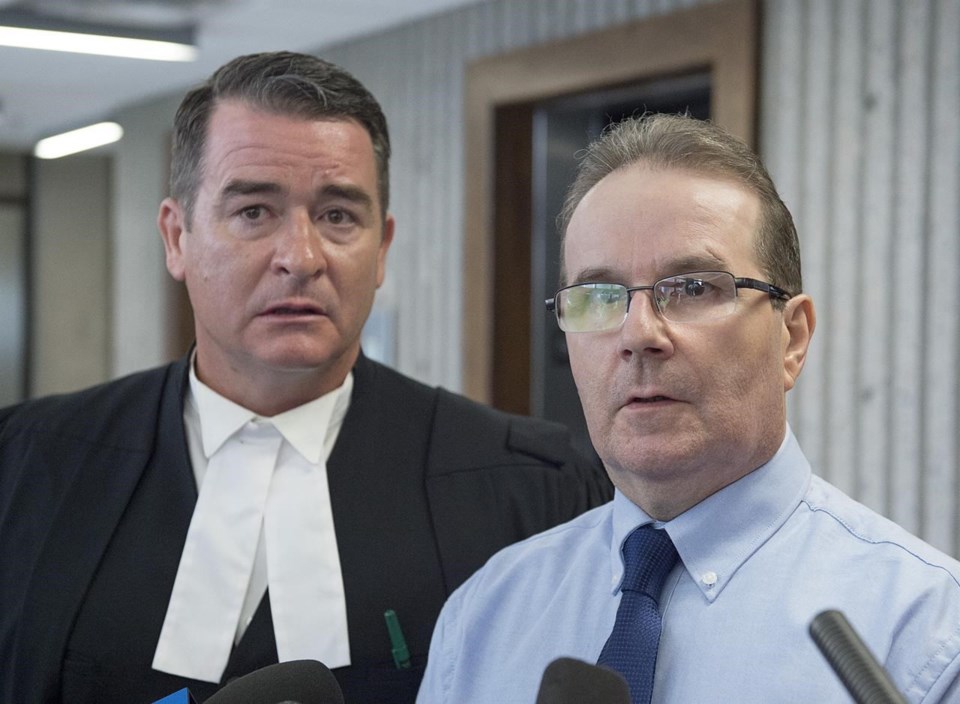HALIFAX — For Sean MacDonald, the push to restart a criminal investigation into police destruction of evidence in the Glen Assoun wrongful conviction case matters both for personal reasons and for the precedent it could set.
The defence lawyer, who teamed with Phil Campbell in the long battle to prove Assoun's innocence, said the ordeal took a huge health toll on the Nova Scotia man, whom he first met in 2006 as he languished in prison for the 1995 murder of Brenda Way.
"Glen suffered and continued to suffer up until the day that he died," MacDonald said in an interview Wednesday, referring to Assoun's death last June at the age of 67.
Assoun spent almost 17 years in jail and five years under strict bail conditions before being acquitted of the killing in 2019. Four months after his acquittal, the province's Supreme Court released the federal investigation of the case, which revealed that an RCMP constable's evidence — both electronic and paper files — pointing toward alternative suspects had been deleted or was missing.
But nearly four years later, a probe of the alleged evidence destruction remains stalled. The British Columbia watchdog agency that originally agreed to investigate dropped the case in April, citing workload issues, and Nova Scotia's justice minister said recently he has adopted a "wait-and-see" approach on what to do about the probe.
MacDonald recalled that in the months before he died, Assoun was unhappy about the sudden halt to the probe and wanted his lawyer to battle on. MacDonald and other Canadian legal experts say the fight has broad implications.
"This has the potential to be a watershed moment because it will raise the bar for police conduct and create a dimension of accountability that, up to this point, to my knowledge has never existed," he said.
MacDonald, who also sits on the board of the legal advocacy group Innocence Canada, says of the 29 findings of wrongful convictions since 1993, Assoun's is the only one he's aware of in which a watchdog agency has been charged with looking into alleged police wrongdoing by both officers and their supervisors.
In 2020, Innocence Canada reviewed seven public inquiries going back to the 1989 royal commission on the prosecution of Donald Marshall Jr. in Nova Scotia. It found only one instance of an officer being prosecuted in a wrongful conviction case, but the case was dropped due to the officer's poor health.
Meanwhile, the issue of police accountability in wrongful convictions remains front and centre, including in the case of Robert Mailman and Walter Gillespie. The two men were cleared this month in a 1983 murder in Saint John, N.B., after serving lengthy prison terms. Innocence Canada has argued that police tunnel vision and the non-disclosure of important evidence, along with disregard for the men’s strong alibis, occurred in the case.
Lawyer Ian Scott, who directed Ontario's Special Investigations Unit — a police watchdog agency — from 2008 to 2013, said in an interview he believes both the criminal probe and an independent public inquiry is needed to prevent against future destruction of evidence.
Scott said in a recent interview the Assoun case stands out because it involves allegations that a senior RCMP officer was aware of evidence and didn't disclose it to defence counsel. "It should have been disclosed. ... It was not disclosed at the appeal and (the RCMP investigator's) superiors were involved in the suppression of that evidence," he said.
The revelations about the alternative suspects evidence were released on July 12, 2019, after The Canadian Press, CBC and the Halifax Examiner won a legal victory to have the information unsealed.
The 82-page case assessment by Justice Department lawyer Mark Green laid out how a joint RCMP-Halifax police unit was alleged to have deleted files created by an RCMP constable who was using an analytical database, referred to as ViCLAS. His analysis suggested that serial killer Michael McGray and Avery Greenough, who had committed sexual assaults, were potential suspects.
Green's report also said that file boxes of Const. Dave Moore's investigation notes had all gone missing while he was on vacation. According to the federal report, Moore was "able to place McGray in the immediate area where Brenda Way worked and lived," by analyzing his welfare cheques. The constable also developed a theory that Greenough may have picked up Way in his vehicle on the night of the murder.
The report described how this wasn't disclosed to Assoun's defence by senior RCMP officers as the defence tried to overturn his conviction before the Court of Appeal in 2006.
The RCMP's response in 2019 was to point to an internal review about the destruction of Moore's computer analysis and state there was "no malicious intent," though there were policy breaches. The report argued a single "overzealous" junior officer was likely responsible for deleting Moore's analytical files.
Scott said this review remains insufficient. "I don't think the public should accept that at face value," he said. Anthony Moustacalis, former president of a national association of criminal lawyers, said in an interview Wednesday that if the criminal probe isn't revived, "the public loses confidence in the justice process."
Meanwhile, MacDonald said he believes records of emails on RCMP servers and interviews with former officers could yield results. "There was information and documents that were contained inside of a highly secured office that somehow disappeared," he said.
Erin Nauss, the interim director of Nova Scotia's Serious Incident Review Team, said in an interview Tuesday that she is in discussions with a police oversight agency to take over the Assoun investigation, after contacting every oversight agency in the country.
"We’ll continue those efforts and should that not be successful, then I am open to exploring other options and being as creative as I need to be to ensure this matter is looked at.”
This report by The Canadian Press was first published Jan. 19, 2024.
Michael Tutton, The Canadian Press

